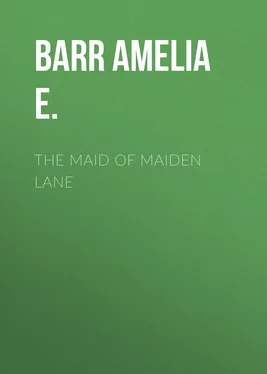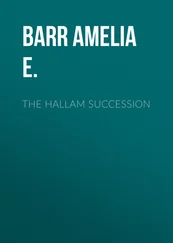Amelia Barr - The Maid of Maiden Lane
Здесь есть возможность читать онлайн «Amelia Barr - The Maid of Maiden Lane» — ознакомительный отрывок электронной книги совершенно бесплатно, а после прочтения отрывка купить полную версию. В некоторых случаях можно слушать аудио, скачать через торрент в формате fb2 и присутствует краткое содержание. Жанр: foreign_antique, foreign_prose, Зарубежные любовные романы, на английском языке. Описание произведения, (предисловие) а так же отзывы посетителей доступны на портале библиотеки ЛибКат.
- Название:The Maid of Maiden Lane
- Автор:
- Жанр:
- Год:неизвестен
- ISBN:нет данных
- Рейтинг книги:3 / 5. Голосов: 1
-
Избранное:Добавить в избранное
- Отзывы:
-
Ваша оценка:
- 60
- 1
- 2
- 3
- 4
- 5
The Maid of Maiden Lane: краткое содержание, описание и аннотация
Предлагаем к чтению аннотацию, описание, краткое содержание или предисловие (зависит от того, что написал сам автор книги «The Maid of Maiden Lane»). Если вы не нашли необходимую информацию о книге — напишите в комментариях, мы постараемся отыскать её.
The Maid of Maiden Lane — читать онлайн ознакомительный отрывок
Ниже представлен текст книги, разбитый по страницам. Система сохранения места последней прочитанной страницы, позволяет с удобством читать онлайн бесплатно книгу «The Maid of Maiden Lane», без необходимости каждый раз заново искать на чём Вы остановились. Поставьте закладку, и сможете в любой момент перейти на страницу, на которой закончили чтение.
Интервал:
Закладка:
Amelia E. Barr
The Maid of Maiden Lane
CHAPTER I
THE HOME OF CORNELIA MORAN
Never, in all its history, was the proud and opulent city of New York more glad and gay than in the bright spring days of Seventeen-Hundred-and-Ninety-One. It had put out of sight every trace of British rule and occupancy, all its homes had been restored and re-furnished, and its sacred places re-consecrated and adorned. Like a young giant ready to run a race, it stood on tiptoe, eager for adventure and discovery—sending ships to the ends of the world, and round the world, on messages of commerce and friendship, and encouraging with applause and rewards that wonderful spirit of scientific invention, which was the Epic of the youthful nation. The skies of Italy were not bluer than the skies above it; the sunshine of Arcadia not brighter or more genial. It was a city of beautiful, and even splendid, homes; and all the length and breadth of its streets were shaded by trees, in whose green shadows dwelt and walked some of the greatest men of the century.
These gracious days of Seventeen-Hundred-and-Ninety-One were also the early days of the French Revolution, and fugitives from the French court—princes and nobles, statesmen and generals, sufficient for a new Iliad, loitered about the pleasant places of Broadway and Wall Street, Broad Street, and Maiden Lane. They were received with courtesy, and even with hospitality, although America at that date almost universally sympathized with the French Republicans, whom they believed to be the pioneers of political freedom on the aged side of the Atlantic. The merchants on Exchange, the Legislators in their Council Chambers, the working men on the wharves and streets, the loveliest women in their homes, and walks, and drives, alike wore the red cockade. The Marseillaise was sung with The Star Spangled Banner; and the notorious Carmagnole could be heard every hour of the day—on stated days, officially, at the Belvedere Club. Love for France, hatred for England, was the spirit of the age; it effected the trend of commerce, it dominated politics, it was the keynote of conversation wherever men and women congregated.
Yet the most pronounced public feeling always carries with it a note of dissent, and it was just at this day that dissenting opinion began to make itself heard. The horrors of Avignon, and of Paris, the brutality with which the royal family had been treated, and the abolition of all religious ties and duties, had many and bitter opponents. The clergy generally declared that "men had better be without liberty, than without God," and a prominent judge had ventured to say publicly that "Revolution was a dangerous chief justice."
In these days of wonderful hopes and fears there was, in Maiden Lane, a very handsome residence—an old house even in the days of Washington, for Peter Van Clyffe had built it early in the century as a bridal present to his daughter when she married Philip Moran, a lawyer who grew to eminence among colonial judges. The great linden trees which shaded the garden had been planted by Van Clyffe; so also had the high hedges of cut boxwood, and the wonderful sweet briar, which covered the porch and framed all the windows filling the open rooms in summer time with the airs of Paradise. On all these lovely things the old Dutchman had stamped his memory, so that, even to the third generation, he was remembered with an affection, that every springtime renewed.
One afternoon in April, 1791, two men were standing talking opposite to the entrance gates of this pleasant place. They were Captain Joris Van Heemskirk, a member of the Congress then sitting in Federal Hall, Broad Street, and Jacobus Van Ariens, a wealthy citizen, and a deacon in the Dutch Church. Van Heemskirk had helped to free his own country and was now eager to force the centuries and abolish all monarchies. Consequently, he believed in France; the tragedies she had been enacting in the holy name of Liberty, though they had saddened, had, hitherto, not discouraged him. He only pitied the more men who were trying to work out their social salvation, without faith in either God or man. But the news received that morning had almost killed his hopes for the spread of republican ideas in Europe.
"Van Ariens," he said warmly, "this treatment of King Louis and his family is hardly to be believed. It is too much, and too far. If King George had been our prisoner we should have behaved towards him with humanity. After this, no one can foresee what may happen in France."
"That is the truth, my friend," answered Van Ariens. "The good Domine thinks that any one who can do so might also understand the Revelations. The French have gone mad. They are tigers, sir, and I care not whether tigers walk on four feet or on two. WE won our freedom without massacres."
"WE had Washington and Franklin, and other good and wise leaders who feared God and loved men."
"So I said to the Count de Moustier but one hour ago. But I did not speak to him of the Almighty, because he is an atheist. Yet if we were prudent and merciful it was because we are religious. When men are irreligious, the Lord forsakes them; and if bloodshed and bankruptcy follow it is not to be wondered at."
"That is true, Van Ariens; and it is also the policy of England to let France destroy herself." "Well, then, if France likes the policy of England, it is her own affair. But I am angry at France; she has stabbed Liberty in Europe for one thousand years. A French Republic! Bah! France is yet fit for nothing but a despotism. I wish the Assembly had more control—"
"The Assembly!" cried Van Heemskirk scornfully. "I wish that Catherine of Russia were now Queen of France in the place of that poor Marie Antoinette. Catherine would make Frenchmen write a different page in history. As to Paris, I think, then, the devil never sowed a million crimes in more fruitful ground."
"Look now, Captain, I am but a tanner and currier, as you know, but I have had experiences; and I do not believe in the future of a people who are without a God and without a religion."
"Well, so it is, Van Ariens. I will now be silent, and wait for the echo; but I fear that God has not yet said 'Let there be peace.' I saw you last night at Mr. Hamilton's with your son and daughter. You made a noble entrance."
"Well, then, the truth is the truth. My Arenta is worth looking at; and as for Rem, he was not made in a day. There are generations of Zealand sailors behind him; and, to be sure, you may see the ocean in his grey eyes and fresh open face. God is good, who gives us boys and girls to sit so near our hearts."
"And such a fair, free city for a home!" said Van Heemskirk as he looked up and down the sunshiny street. "New York is not perfect, but we love her. Right or wrong, we love her; just as we love our mother, and our little children."
"That, also, is what the Domine says," answered Van Ariens; "and yet, he likes not that New York favours the French so much. When Liberty has no God, and no Sabbath day, and no heaven, and no hell, the Domine is not in favour of Liberty. He is uneasy for the country, and for his church; and if he could take his whole flock to heaven at once, that would please him most of all."
"He is a good man. With you, last night, was a little maid—a great beauty I thought her—but I knew her not. Is she then a stranger?"
"A stranger! Come, come! The little one is a very child of New York. She is the daughter of Dr. Moran—Dr. John, as we all call him."
"Well, look now, I thought in her face there was something that went to my heart and memory."
"And, as you know, that is his house across the street from us, and it was his father's house, and his grandfather's house; and before that, the Morans lived in Winckle Street; and before that, in the Lady's Valley; so, then, when Van Clyffe built this house for them, they only came back to their first home. Yes, it is so. The Morans have seen the birth of this city. Who, then, can be less of a stranger in it than the little beauty, Cornelia?"
Читать дальшеИнтервал:
Закладка:
Похожие книги на «The Maid of Maiden Lane»
Представляем Вашему вниманию похожие книги на «The Maid of Maiden Lane» списком для выбора. Мы отобрали схожую по названию и смыслу литературу в надежде предоставить читателям больше вариантов отыскать новые, интересные, ещё непрочитанные произведения.
Обсуждение, отзывы о книге «The Maid of Maiden Lane» и просто собственные мнения читателей. Оставьте ваши комментарии, напишите, что Вы думаете о произведении, его смысле или главных героях. Укажите что конкретно понравилось, а что нет, и почему Вы так считаете.












